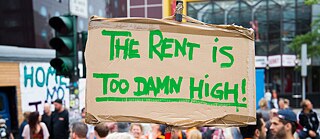Worlds of Homelessness
The Right to Housing
Berlin and Los Angeles are faced with a common problem: homelessness. Journalist Caroline Porter demonstrates how traditional ideas surrounding homelessness are changing and discusses some creative new solutions.
Listen to this episode: Apple Music | Spotify | Download
This episode is by Caroline Porter. Caroline is a journalist and media strategist based in Los Angeles. She served as a staff reporter for “The Wall Street Journal” in the Chicago and Los Angeles bureaus, covering U.S. news and education. In this podcast, Caroline talks to German professor Jutta Allmendinger, among other experts on the subject. This episode is a contribution of the Thomas Mann House, where Professor Jutta Allmendinger was a fellow in 2018, devoting her research to homelessness in Los Angeles and Berlin.
Under the headline “Worlds of Homelessness,” the Goethe-Institut USA is featuring an online collection of articles on homelessness.
Transcript
Caroline Porter: For the American-German listening series, THE BIG POND, I’m Caroline Porter in Los Angeles. Today we look at homelessness in Berlin and Los Angeles. Despite more awareness, there are more people struggling to find secure housing. Through the lens of Berlin and L.A., we examine how old ideas of homelessness are evolving, and we see what creative solutions are cropping up on the fringe of mainstream policy. But first, a story:
Ananya Roy: A young man, about 17 years old, Ranjan, came up to me and said, “Didi,” which means “elder sister” in Bengali. And he said, “You live in America, and we are told that that is the richest country on Earth. And yet we have also heard that there are lots of homeless people in America. How can that be the case?”. In response to every explanation I gave him about American poverty and particularly about this thing called homelessness, he kept coming back to me and saying, “Well, I don’t understand it. They can be poor, but don’t they have rights?”
Caroline Porter: You’re listening to the voice of Ananya Roy. She is the director of the Institute on Inequality and Democracy at UCLA, and she is a professor of urban planning, social welfare, and geography. Her research has focused on the developments of major cities and how those developments impact people. Sitting with her recently, my conversation with her became the linchpin in my understanding of modern homelessness.
Ananya Roy: We’ve got to think about the actual facts of homelessness as well as the political framing of homelessness, in relation to rights and claims.
Caroline Porter: In relation to rights and claims: What does this really mean? My reporting consistently took me back here. Yes, we know that homelessness can be related to mental illness and substance abuse, but what’s happening today is bigger still. When people in Los Angeles or Berlin see new tents going up on their streets, what they are seeing is the trickle-down impact of stagnating wages, higher and higher rent, and a lack of protections for people. But I’m getting ahead of myself. Let’s review some of the basics. I set out to compare the issue of housing precarity in Los Angeles with Berlin. Both cities have populations of nearly 4 million, and both cities are cultural hubs for their countries. Los Angeles found in its most recent homeless count that about 36,000 people are homeless in the city itself. In Berlin it’s unclear what the numbers are, but they appear to be much smaller. Experts in both cities have said that the numbers of homeless people are rising. To better understand this, I talked with Jutta Allmendinger, a sociologist in Berlin who also is the president of WZB Berlin Social Science Center. She came to L.A. in 2018 to study homelessness here and compare with the issue in Berlin.
[SKYPE MUSIC / TELEPHONE RINGING]
Caroline Porter: Hello!
Jutta Allmendinger: Hallo?
Caroline Porter: Hello?
Jutta Allmendinger: Hello?
Caroline Porter: Hi there.
Jutta Allmendinger: Oh. Can you understand me easily?
Caroline Porter: Yes. Can you understand me?
Jutta Allmendinger: Not really very well, I have to admit.
Caroline Porter: Once we got through those audio glitches, we started talking about what’s changed in Berlin. For one, there were protests in the streets around housing this spring.
Jutta Allmendinger: The recent protests in Berlin about rent control, about housing, housing inequality, also had a significant impact on how the homeless people are observed. While those people for decades or centuries in Germany were considered to be either alcoholics or drug abusers, they now are seen as very, very different. They are now observed as people who simply can’t find housing given that the housing situation has deteriorated extremely over the last 10 years.
Caroline Porter: That’s interesting. And what do you account that change to, in the last 10 years?
Jutta Allmendinger: Well it’s in part a success story of Berlin. So, Berlin has transformed given that it is a capital, that there is not the wall anymore, that the influx of people from all over Europe, but more than that it is high with more developers coming into Berlin, the housing market changed rapidly. So that there is much more luxury housing, and it comes to the expense of social housing.
Caroline Porter: What Jutta said about housing in Berlin being more expensive sounds like something I often hear anecdotally in L.A., and the numbers back up the stories. In 2018, the city and county together helped 22,000 people find permanent housing. But the number of homeless people in the city of L.A. still rose 16 percent, to 36,300 people. Public officials say that their reforms are working and cited economic pressures, like rising housing costs and low wages as evidence of a swelling problem. What we’re talking about are the working homeless, people who go to work every day but cannot afford a place to live.
Jutta Allmendinger: I was one of the very first fellows of the Thomas Mann House in Pacific Palisades, and I met a man at the beach, and he was not dressed like I thought that homeless people are dressed, and I asked him, “What are you up to? Did you sleep at the beach?” And he said, “Yes, I slept at the beach, and now I’m going to teach at school.” And I said, “Well, are you a schoolteacher?” And he agreed, yes he is a schoolteacher, but that he doesn’t make the money to find housing.
Caroline Porter: Another German researcher, Lisa Riedner, an anthropologist, has found something similar about the working poor in Germany. She tells a story of a time she went to visit a group of homeless people in Berlin.
Lisa Riedner: My perspective on the city, on living in the city, changed because we walked around the streets and were looking for wood or anything that would burn to make a fire to have some, to warm up a little bit, and all of a sudden I changed the perspective from this idea that it’s normal that people have housing and that you can go home and have a warm place to be in, to stay. And I had this idea that actually housing is becoming more and more of a privilege.
Caroline Porter: So for both Berlin and Los Angeles, homelessness is a changing landscape. It increasingly has to do with economics, the economics of something considered a human right, the right to housing. My second takeaway is about how people in Berlin and Los Angeles are leveraging these rights as individuals, as groups, and as international networks.
Suzette Shaw: So, my name is Suzette Shaw, and I write, talk, and advocate Skid Row from a woman’s perspective.
Caroline Porter: Thousands of people live in downtown Los Angeles in an area called Skid Row. That’s where Suzette spent about three years in transitional housing before moving on to permanent housing in July 2016, though remaining in the neighborhood.
Suzette Shaw: I didn’t come to Skid Row to be an advocate, but I found my voice as an advocate here. Even in the midst of while we talk around, talk about, a paradigm shift and we talk about, you know, equity and bringing changes and really trying to be intentional about the work, I still feel in the spirit of my being, I still feel there’s so much cognitive dissonance, so much cognitive dissonance, privilege that goes on, of people who are at the helm, running things, leading things, do-gooders coming into the community, people, they’re nonprofits, and they’re so ... it’s all about them, when I hear them sometimes. And why this is so important, it’s not for me to throw shade at them, it’s really about the fact of how so much dollars gets allocated towards homelessness and poverty, but how much of that dollars really penetrates and gets directly to the needs of the people?
Caroline Porter: In recent years Los Angeles passed two propositions to provide billions of dollars to support more housing and more homeless services. But it still feels like a slow climb. Enter, the L.A. Tenants Union.
Tracy Rosenthal: The Tenants Union is not an organization, it’s a movement. And we focus on organizing tenants to build tenant power, rather than intervening in policy debates, although we do that too. And our work is focused on two ideas: the homes guarantee and the right to stay put. And those are both, I think, very important reframes on what we normally think of as housing activism. So we’re distinguishing tenants organizing from housing activism, because housing isn’t the protagonist of our solutions, tenants are.
Caroline Porter: You’re listening to the voice of the co-founder of the Los Angeles Tenants Union, Tracy Rosenthal. The L.A. Tenants Union reframes the idea of who qualifies as a tenant.
Tracy Rosenthal: We definitely use the word tenants because we want to make it obvious just how related anyone who doesn’t control their own housing is, and I think that’s fundamental to tenants who are living inside and tenants who are living outside, and I often use people who are living outside and people who are living inside as a way of saying that everyone’s got to live somewhere. And we often talk about our unhoused neighbors because we organize according to locals, and we organize with our neighbors. If you live in proximity to someone with regularity, that person is your neighbor, and you can choose to ignore that and dehumanize people who are your neighbors and not recognize them as such, but when we do the work of calling them neighbors and when we do the work of calling both of y’all tenants, I think the idea is to find the point of intersection, the point of commonality, the point of solidarity that really can exist and also must exist if we’re really going to get the solutions that we need.
Caroline Porter: Meanwhile, in Berlin, it’s worth noting that protests this spring worked in their own way. In Berlin this June, government leaders approved legislation that calls for a five-year freeze on rent prices. And at the global level, in January 2019, the Housing Justice in Unequal Cities Network kicked off their first big conference. They discussed research and ways to share within the network about evictions, homelessness, and discrimination.
Ananya Roy: The Institute on Inequality and Democracy at UCLA is home to a newly launched global research network called Housing Justice in Unequal Cities. We’re delighted that we have support from the National Science Foundation for four and a half years to run this network. The idea behind the network is that around the world there are many different manifestations of what we may call a housing crisis. The network though focuses not so much on the housing crisis but on housing justice. It is also our argument that as there is a housing crisis in many cities of the world, particularly in cities that we see to be deeply unequal, there is also in those cities tremendous mobilization around tenant rights, around fighting predatory financialization, around building new models of social housing, new forms of collectivism, be it community land trusts or limited equity co-ops, and we wanted therefore to build a network that would center this work of housing justice.
Caroline Porter: We’ve heard some of the things going on at the global level, at the city level, and at the individual level. And to that last point, I want to end with words from Kelvin Martinez, who worked in homeless services for years.
Kelvin Martinez: When we’re talking about homelessness in Los Angeles, obviously what comes first to mind is homes, and the housing crisis, and affordable housing, rent control, and obviously those are huge, huge issues that determine really the magnitude of the problem that we’re in right now. But what I learned in the center and through a lot of my relationships and interactions there is that on our way towards providing people with housing, if we’re missing the human elements and the human connections that need to be there, we’re going to miss out on a lot of what actually makes people well, and the things that make housing a success.
Caroline Porter: This is Caroline Porter in Los Angeles. Thank you for listening.







